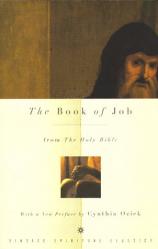About the Book
About the Book
The Book of Job

The Vintage Spiritual Classics present the testimony of writers across the centuries who have pondered the mysterious ways, unfathomable mercies, and deep consolations afforded by God to those who call upon Him from out of the depths of their lives. These writers are our companions, even our champions, in a common effort to discern the meaning of God in personal experience.
"God is our home but many of us have strayed from our native land. The venerable authors of these Spiritual Classics are expert guides--may we follow their directions home."
--Archbishop Desmond Tutu
The questions, discussion topics, and background information that follow are designed to enhance your group's reading of the six works that make up the first series in Vintage Spiritual Classics. We hope they will provide you with a variety of ways of thinking and talking about these ancient and important texts. We offer this word about the act of reading these spiritual classics. From the very earliest accounts of monastic practice--dating back to the fourth century--it is evident that a form of reading called lectio divina ("divine" or "spiritual" reading) was essential to any deliberate spiritual life. This kind of reading is quite different from that of scanning a text for useful facts and bits of information, or advancing along an exciting plot line to a climax in the action. It is, rather, a meditative approach, by which the reader seeks to taste and savor the beauty and truth of every phrase and passage. There are four steps in lectio divina: first, to read, next to meditate, then to rest in the sense of God's nearness, and, ultimately, to resolve to govern one's actions in the light of new understanding. This kind of reading is itself an act of prayer. And, indeed, it is in prayer that God manifests His Presence to us.
The Book of Job, a dramatic poem composed sometime between the seventh and fifth centuries b.c.e., is concerned with the suffering of the innocent. It speaks today to the torment of anguish and solitude when the burdens of our humanity exceed the reach of cure, of palliatives, and of all manner of sympathetic human intervention. Then, in unexpected and even terrible ways, God's grace is amazingly given. Job teaches us to recognize and be open to these divine visitations.
As Cynthia Ozick observes in her Preface, we approach The Book of Job without the weight of scholarly knowledge, and "there is something to be said for novice readers who come to Job's demands and plaints unaccoutered: we will perceive God's world exactly as Job himself perceives itÉJob's bewilderment will be oursÉ.For us to be as (philosophically) naked as Job will mean to be naked of bias, dogma, tradition. It will mean to imagine Job solely as he is set forth by his own words in his own story."
The Book of Job
- Publication Date: December 29, 1998
- Paperback: 144 pages
- Publisher: Vintage
- ISBN-10: 0375700226
- ISBN-13: 9780375700224






